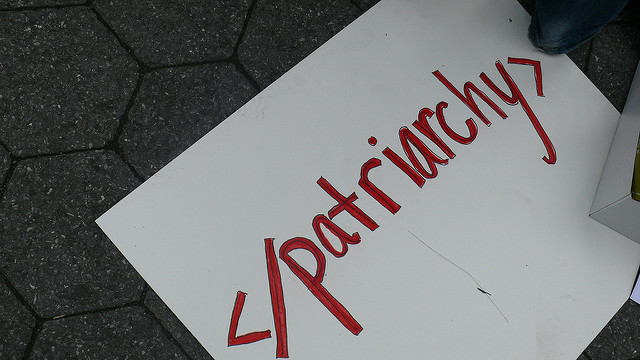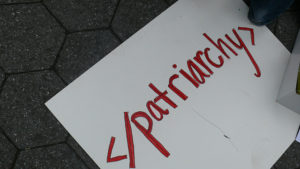By Jo P. DeLos Santos, associate professor of English, communications and humanities at Davidson County Community College.
I feel drawn to empty frames, especially old window frames. Limitless possibilities seem to exist wherever frames are empty, but frames, by definition, impose very real limits. One of the primary frameworks we all operate within is gender. Even if we see ourselves past all the “gender stereotypes,” we still operate in a world that is saturated with notions of maleness and femaleness. Feminists continue to push gender boundaries and inhabit roles in society that render “women’s work” as an outdated and ridiculous concept. Good for us. Patriarchy has never been our friend and we have consistently denied its power over us. Women can be the leader, the breadwinner, the boss, and the creator. Some less evolved men feel threatened by our progress, but many, I dare say most men are relieved to have a partner rather than a dependent in romantic and business relationships.
I will go a step further and claim that patriarchy hasn’t just harmed women with its gendered framework. Men too, are a casualty of the framework of patriarchy. Yep, you read that right! Patriarchy hurts men too. It separates men from most of their emotions, limits the possibilities of their friendships, and sets them up as little more than revenue streams for their families. Men cannot be whole authentic persons under patriarchy. Gender framework marginalizes them as much as it does women.
Women are allowed all of the emotions except for anger. Angry women are bitches and ball busters. The stereotype of the angry feminist resonates because its framework supports anger as a male emotion. Men on the other hand aren’t allowed any emotions other than anger. There was a man in my spiritual community that teared up publicly every time he spoke of his love for his children. It was endearing at first because he was “in touch with his feelings.” Over time though, his habitual tears were met with whispers of women, even feminists within the community, who felt he really needed to “man up.” Anger is reserved for men. They don’t cry or feel; they problem-solve. Most women in romantic relationships with men know that men do cry and feel, but doing so openly will cost most men their masculinity.
The archetype of patriarchy that paints men as singularly overcoming obstacles with individual action and has rendered male friendships outside of alcohol and sports as virtually non-existent. At the community college where I teach, young men follow many of their affirming statements to one another with the phrase, “no homo, dude.” Feelings of admiration, caring and love between men are strictly regulated by patriarchal framework. Most men maintain close relationships with childhood friends, but making adult male friends is tricky business. Mothers and wives are safe emotional landing strips, but sharing feelings with other men falls outside of heterosexual male frame. Men rarely face one another in conversations that encompass hopes, dreams and disappointments. Sports talk and bar dwelling are male substitutes for relationships that are off limits for them.
Caregiving roles are also regulated by the patriarchy for men. They are to be the breadwinners, decision-makers, and family leaders according to framework of patriarchy. No matter how strongly we feel that we have evolved past this notion, our thoughts and words belie what we really think. Sometimes when I pass the house in my neighborhood where the stay-at-home dad of teenaged daughters lives, I wonder what it is that he does in his house all day long while his girls are at school. I can honestly say that I have never wondered what stay-at-home moms in my neighborhood do inside their homes regardless of their children’s ages. Our patriarchal culture demands that men account for caregiving behaviors, especially if they get in the way of bread winning.
We have long raged against the Disney model of the damsel in distress that must be beautiful, vulnerable and savable. We have failed to designate the knight in shining armor just as flawed. Tall, decisive, handsome, rich princes are no more realistic than helpless princesses. Men are clear about what patriarchal culture requires of them. They are to perform maleness through providing and problem solving for their families, pushing down the bulk of their emotions, and denying themselves authentic male friendships. Gloria Steinem said, in a 1998 PBS interview, “ If you’re going to have a male dominant system, to maintain the system, you have to teach men to dominate. ” Women are reclaiming anger, self-determination and leadership. It is past time for men to have the space, freedom, and cultural framework to explore caregiving, friendships, and access to their very own emotions without the gaze of judgement through the window of patriarchy.
Jo P. DeLos Santos is an associate professor of English, communications and humanities at Davidson County Community College.


There are no comments
Add yours